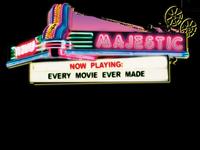| Thursday, October 7, 2004 |
| Grassroots TV Networking |
 Via Slashdot a couple of excellent articles from Mark Pesce on Big Media versus Peer-to-Peer Media. Redefining Television and Rolling your own Network. Years ago Mark was the main inventor of the VRML standard for 3D graphics. He's an inspiring fellow in many other areas now, like here on media activism. His last name is said like "Peshee", btw. I only met him once, and I accidentally called him "Pesky". Anyway, he's in Australia now. So, first of all, there are some media organizations that actually are starting to do the right thing: Via Slashdot a couple of excellent articles from Mark Pesce on Big Media versus Peer-to-Peer Media. Redefining Television and Rolling your own Network. Years ago Mark was the main inventor of the VRML standard for 3D graphics. He's an inspiring fellow in many other areas now, like here on media activism. His last name is said like "Peshee", btw. I only met him once, and I accidentally called him "Pesky". Anyway, he's in Australia now. So, first of all, there are some media organizations that actually are starting to do the right thing: The BBC doesn't have the bandwidth to netcast its programming to all 66 million of its viewers. Fortunately it doesn't that kind of capability, because the BBC has cleverly designed the Flexible TV application to act as a node in a Peer-to-Peer network. Anyone using Flexible TV has access to the programs which have been downloaded by any other Flexible TV client, and can get those programs directly from them. All BBC need do is provide a single copy of a program into the network of P2P clients, and they handle the work themselves. More than this, because of the P2P technology used by the BBC .. a Flexible TV user can get a little bit of the program from any number of other peers; rather than going through the process of downloading an entire program from one other peer, the Flexible TV client can ask a hundred other clients for small sections of the program, and download these hundred sections simultaneously. Not only does this decrease the amount of traffic that any clients has to handle, it also means that it produces a virtuous cycle: the more popular a program is, the more copies of it will exist in the network of peers, and therefore the more easily a peer can download it.It seems so logical. There are powerful distributed networks out there, which makes it possible to quickly locate and download video or audio content, with little burden on the orginal distributor, no matter how many people download it. There's really no reason you shouldn't easily have access to any piece of media ever made whenever you feel like it. No reason other than that a small number of very large media companies would like you not to. But, as he says, Fuck 'em. They'll either have to provide something like that themselves, or regular folks will, and who cares if it is illegal. He goes on to describe how very simple and cheap it is to capture broadcast TV shows on a computer and to share them on the net. Not news to techies, but the details might not have sunk in for everybody. So, here's a bit on BitTorrent, one of the best approaches to file sharing. How is this bit of technological magic achieved? Through the use of a new technology known as BitTorrent - something some of you may have already used. BitTorrent is a P2P filesharing system specifically designed to prohibit one of the biggest social ills which plague P2P networks - a phenomenon known as "leeching". A leech grabs files from a P2P network without providing anything in return. With BitTorrent your download speed - how fast you receive your data - is determined by how much data you're sharing. This means that a torrent starts slowly - because you haven't much to share - and then increases nearly exponentially; as you have more of the file, you have more to share, so your bandwidth increases, until the file is fully downloaded.Works really well. Makes it painless to download DVDs full of .. whatever. And, yes, with tools like that, any of us can put up our own TV network. And we can see what we want to see, when we want to see it. And to the degree that BigMedia tries to stop us from doing that, they're on their way out. Within a decade - and perhaps a lot sooner - the television networks will have been deprived of nearly all their pre-produced programming. Television will become a live medium - as it was in its beginning, so it will be in its old age. Sports, news and event programming (terror attacks and awards shows) will be the staples for broadcasting in the 21st century. Advertisers will love live television - because it's where the people are - but never again will a television broadcaster be able to dictate to you what you can watch and when you can watch it. Those days are already past - at the price of a small crime of copyright violation.But even though the tools are there, it is still a bit technical to find your favorite TV show on the net. And if you want to share something, there are a number of different tools you need to put together, and you need to be even more technical. It is just a matter of time, but so far it is not yet easy for just anybody to do it. What we need is a single tool to wrap it all up in a nice, easy to use form. We need a tool which makes publishing content into this media stream no more difficult than selecting a audiovisual file. We need a tool which makes finding the programming you're looking for as easy and straightforward as Google. And we need all of this to be one single tool, so that we can forever erase the false distinction between producer and audience, between professional and amateur which has kept most voices silenced as a few have used their positions as professional producers to push a pack of lies down our throats.But at the same time there are corrupt politicians in a number of countries who're trying hard to figure out to make it illegal to share things. Preferably altogether illegal to use methods of data sharing that possibly, potentially could distribute media that is somebody's intellectual property. No, they don't care about your particular intellectual property, it is the property of a dozen media companies we're talking about. But, as it is often said: the internet sees censorship as damage, and routes around it. So, yes, most likely the media landscape has changed irreversibly, and it is just a matter of time before the change will be ubiquitous. A key piece will probably be the distributed production of media, so it truly isn't about ripping off movies without paying, but about communicating. The blog world again demonstrates some good principles there. I really would have little interest in distributing other people's copyrighted articles in full in my blog. All I want is to pick out a few things, remix them, and say what I have to say. And I'd generally much rather have somebody's personal story and views than BigMedia versions. So, if we added the capability to produce audio and video as easily as we can produce text, then we'd be getting somewhere. [ Information | 2004-10-07 15:36 | 5 comments | PermaLink ] More > |
| George Soros and FactCheck |
 George Soros now has a blog. He's done many good things like the Open Society Institute. And, now, it is quite useful when a billionaire can put some significant resources behind opposing George Bush's regime. George Soros now has a blog. He's done many good things like the Open Society Institute. And, now, it is quite useful when a billionaire can put some significant resources behind opposing George Bush's regime.
Yesterday Soros got a good deal more traffic than he had expected. During the U.S. vice presidential debate, Dick Cheney suggested for the viewers to go to factcheck.com to get the truth about accusations made about his former company Haliburton. And after the debate, an average of a hundred people a second went to that site. It is just that Cheney unfortunately had given the wrong URL. He had meant to say factcheck.org. Factcheck.com happened to be some random commercial site hosted by some people in the Cayman Islands. When they realized what had happened, they decided it would be a better idea if they redirected all that traffic to Soros' site, even though he has no relation to them. A good political statement, and Soros' server could probably handle the traffic load. Which factcheck.org is having a bit of trouble with. Seems like a fine and objective site, though. I think Cheney regrets that he tried to mention it, as they found quite a few more flaws in what he said than in what Edwards said. Cheney wrongly implied that FactCheck had defended his tenure as CEO of Halliburton Co., and the vice president even got our name wrong. He overstated matters when he said Edwards voted "for the war" and "to commit the troops, to send them to war." He exaggerated the number of times Kerry has voted to raise taxes, and puffed up the number of small business owners who would see a tax increase under Kerry's proposals.Hard work to keep those guys honest, I'm sure. While watching their debate, I thought they came out about even, but now reading the fact check analysis, it is obvious that they didn't do equally well in the truth department. [ News | 2004-10-07 15:54 | 4 comments | PermaLink ] More > |
| Every movie ever made |
 BoingBoing mention of current Wired article The Long Tail, about how, in the online world, there's now a viable market for lots of books and movies that aren't bestsellers or hits, and that you wouldn't find at Blockbusters or Barnes and Nobles. All those items far down the list of the top 500,000 books or films. That would be the "long tail". And if they don't need to actually be stocked in an actual store, and if clever search technologies, like Amazon's recommendations, make them easy to find, there's no reason not to sell them. And one might actually find that, put together, those fringe items outsell the hits. Summary: BoingBoing mention of current Wired article The Long Tail, about how, in the online world, there's now a viable market for lots of books and movies that aren't bestsellers or hits, and that you wouldn't find at Blockbusters or Barnes and Nobles. All those items far down the list of the top 500,000 books or films. That would be the "long tail". And if they don't need to actually be stocked in an actual store, and if clever search technologies, like Amazon's recommendations, make them easy to find, there's no reason not to sell them. And one might actually find that, put together, those fringe items outsell the hits. Summary:Short form: The rise of online distribution and its unlimited shelf space is leading to a dramatic shift in the entertainment business from hit-driven economics to niche-driven economics. Content that was once relegated to the fringe, beneath the threshold of commercial viability, is now increasingly able to find a market in distributed audiences. The interesting work is now in finding way to push demand down the Long Tail.None of this should be any kind of surprise to anybody paying attention to the internet. Of course we want access to everything ever made, and if it is out there, there will be somebody who's interested in it. Duh. I guess the guy's mostly preaching some marketing speech to media and book companies, to tell them they can make money and be a little more hip by forking over more of what they're sitting on. And he gives examples of people who've done that. And his advice to them is decent: Make everything available. Make it cheap. Make it really easy to find. Really, some more fundamental things need to change. A free market is to deliver what people want for what they're willing to pay for it. And it has certain inherent mechanisms for adjusting these things. In a free market it is a no-brainer to make available everything that it is possible to make available, and to make it attractive for people to pay for it. But the media companies are instead operating from a monopoly position, deliberately limiting the supply and forcing artificially high prices to be paid for imaginary services. Changing that takes more than just having them realize how they can make money by doing it with more of their inventory. But a good start, maybe. And, yeah, I want equal access to every movie, tv-show and book ever written. [ Information | 2004-10-07 20:25 | 1 comment | PermaLink ] More > |